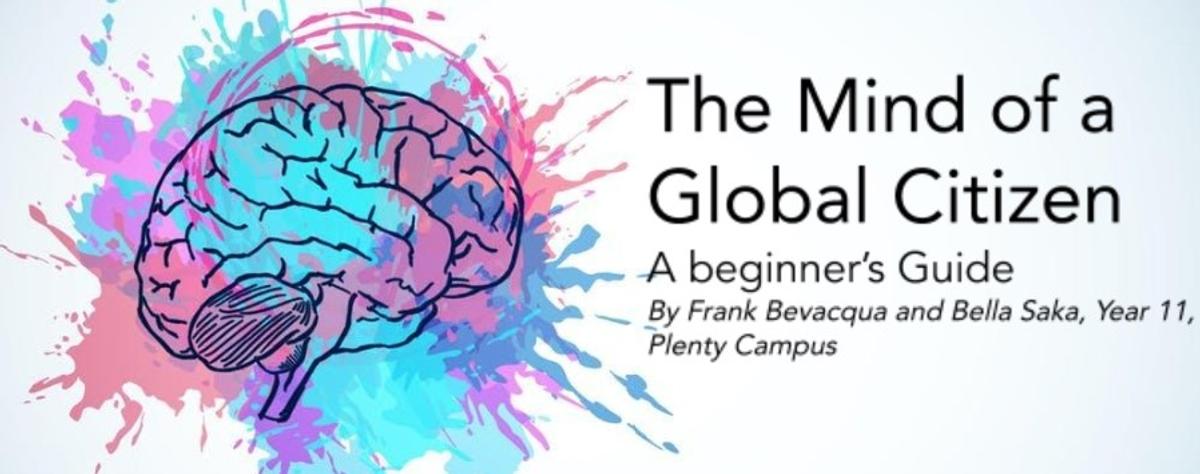A Guide to Being a Global Citizen
Artwork by Cherian Huang, Year 8, The Ridgeway Campus

A Guide to Being a Global Citizen
Artwork by Cherian Huang, Year 8, The Ridgeway Campus


You. Your household. Your street. Your suburb. Your school. Your state. Your country. Your continent. The globe.
You are one in 7 Billion.
So why does anything you do, matter? How does your next move impact the future of humanity?
The answer is simple - you are a global citizen.
Here’s a simple guide on how to become a global citizen. Not just from us, but from multiple members of the globe.
This guide is for everyone in our school community - including teachers, students and parents. Further, this article is for every individual throughout our shared global community. We invite you to read this article and form your own perception of how you can be the best global citizen you can be.
Because ‘at the end of the day it’s our planet and our world, and if we destroy it what are we going to leave for future generations?’ It all starts with you.
So, you might be asking – what is global citizenship? Well, we interviewed the best and the brightest global citizens we know (and Mr Brown) and here’s what they had to say….
Global citizenship is a concept comprising your ‘head, heart and hand’ - that is, your cognitive, social, emotional and physical involvement in our shared world. The cognitive aspect involves ‘knowing what’s happening in the world’ and being ‘aware of global events and politics’. While the social and emotional aspect requires us to ‘respect ourselves and others’ and show empathy and compassion. Arguably the most important component, the physical entails simply helping those in need, ‘doing the right thing’ and showing support for ‘social justice’.
To summarise, global citizenship is the “initiative to emphasise the interconnected nature of our contemporary lives” … (You can tell Mr Bourne is an English teacher).
However, the true beauty of global citizenship is that it’s open for interpretation. The global citizens we interviewed all had different perceptions of what it means to be a global citizen, and with this we propose to our readers that you reflect on and form your own understanding and meaning of global citizenship.
Here are some examples of global citizenship at its finest. It is important to realise that often ‘the trap that we fall into [is] making it bigger than what it needs to be’…. It’s not about large-scale actions to save the world, it’s about the small, simple things…. The small steps reflect the concept of the ‘teaspoons of change’.
Some of our interviewees offered perfect examples of ‘teaspoons of change’ that are achievable for the likes of you and me.
One staff member has recently been checking in on their elderly neighbours, whether this is knocking on the door, taking out the bins on their behalf or simply saying 'hi'.
While others emphasised support for sustainability, which often gets put on the back foot. This support includes minimising waste, conserving energy by turning off heating when it is not needed, recycling and even setting up a compost bin.
For those who have gone on school trips, global citizenship involves keeping and maintaining strong connections with those you’ve met - whether it’s ‘keeping in contact with children in Cambodia through social media’ or maintaining contact with students from other schools met on Round Square Conferences. Communication is a key aspect of maintaining a global connection.
Well, you might be thinking ‘all these years at school, where was global citizenship’? Not only is it in our ideals and round square programs, but in everyday classrooms as well.
Within science, you learn about viruses, immune systems, and the development of our human nature. And in maths, the requirement of analysing data and statistics to provide accurate communication serves to educate all members of the global community.
In English, it’s about relating globally relevant issues to texts, but it’s often about noticing universal values and putting aside bias perceived in media.
Every aspect of our learning is developing all of us as human beings and therefore expanding our ability to act as improved global citizens. We encourage you to embrace every moment of your schooling to develop as a better global citizen.
At recess and lunchtime, it is about being inclusive and celebrating that our community has connections with almost all nationalities globally, through students, teachers and Round Square.
We are not asking you to become global citizens overnight… (but you can shoot for the stars straight away). In the rise of the COVID-19 pandemic, being a global citizen is more crucial than ever. Right now, it’s taking on a different form.
Here’s a list of our top 5 requirements of being a good global citizen during the COVID-19 pandemic.
And that’s the end of our guide on becoming a global citizen!
We really hope that as a member of our community, you take every opportunity to be a global citizen. Because whilst ‘we are just human beings’, every action, every step, every thought, every move makes a difference to this planet.
The globe. Your continent. Your country. Your state. Your suburb. Your school. Your street. Your household. You.
In 7 Billion you are one. Everything starts with you!
We would like to thank the following teachers for their insight and opinion in helping us create this guide: Mr Brown, Ms Zammit, Ms Rowe, Ms O’Keeffe, Mr Lauber, Mr Bourne, Ms Scott, Mr Caracella and Ms Shamoail.
Goodbye for this edition of The Ivy Voice.
Over and out!